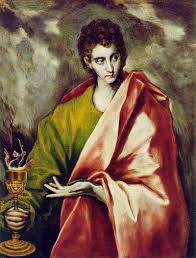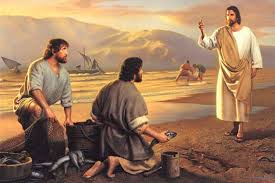
Summary of St John, Evangelist. John was the son of Zebedee, a fisher man from Bethsaida near the Sea of Galilee. With his brother James and Peter, he shared in some of the most significant events in the life of Jesus and wrote about them in the Fourth Gospel.
 Said to be the author of the fourth gospel, John is identified with “the disciple Jesus loved” who took Mary as his adoptive mother. In later life both Mary and John are associated with Ephesus, where John’s tomb is venerated and Mary’s house is preserved.
Said to be the author of the fourth gospel, John is identified with “the disciple Jesus loved” who took Mary as his adoptive mother. In later life both Mary and John are associated with Ephesus, where John’s tomb is venerated and Mary’s house is preserved.
(The image left was painted by Doménikos Theotokópoulos, i.e. El Greco – the Greek).
Patrick Duffy tells John’s story.
The Fourth Evangelist
The tradition that identifies John as the author of the fourth gospel goes back to the 2nd century and his identification with the beloved disciple of that gospel (Jn 13:23, 19:26, 20:2, 21:7 and 21:20), was widely accepted until more modern scholars, who are inclined to say that John, the son Zebedee, is not the author of the fourth gospel. The Gospel of John is strictly speaking considered to be anonymous but Christian tradition historically has attributed it to John the Apostle, son of Zebedee, one of Jesus’ Twelve Apostles and supported by his followers.
Son of Zebedee
 John and his brother James were the sons of Zebedee, a fisherman from Bethsaida (Hebrew “house of fishing”) near the Sea of Galilee. Their mother is sometimes identified with the Salome who later served Jesus and stood with Mary and the other women under the cross (Mt 27:56). She had been bold enough to ask that her two sons would sit on either side of Jesus in his kingdom (Mt 20:20-21). The ardent temperament of the two brothers is revealed both in their nickname Boanerges “Sons of Thunder” (Mk 3:17) and the fact that they wanted to call down fire from heaven on a Samaritan town that did not welcome Jesus (Lk 9:51-56).
John and his brother James were the sons of Zebedee, a fisherman from Bethsaida (Hebrew “house of fishing”) near the Sea of Galilee. Their mother is sometimes identified with the Salome who later served Jesus and stood with Mary and the other women under the cross (Mt 27:56). She had been bold enough to ask that her two sons would sit on either side of Jesus in his kingdom (Mt 20:20-21). The ardent temperament of the two brothers is revealed both in their nickname Boanerges “Sons of Thunder” (Mk 3:17) and the fact that they wanted to call down fire from heaven on a Samaritan town that did not welcome Jesus (Lk 9:51-56).
Left the Baptist to Follow Jesus
It is likely that John had been a disciple of John the Baptist. When the Baptist pointed to Jesus as the Lamb of God, John and his brother James went with Peter’s and his brother Andrew to follow Jesus (Jn 1:35-42). John together with his brother James and Peter were with Jesus for the more significant events of Jesus’ life, such as the raising of Jairus’ daughter (Mk 5:35), the transfiguration (Mk 9:2) and the agony in the garden (Mk 14:32-42).
A Leader in Jerusalem and in Samaria
After the death and resurrection of Jesus, John seems to have stayed in Jerusalem as one of the leaders with Peter of the followers of Jesus (Acts 1-4) and testified to the resurection before the Sanhedrin (Acts 4:5). He and Peter went to Samaria to confirm new converts (Acts 8:14, 25). And when Paul is converted, he submits his orthodoxy to those reputed to be “pillars” of the young church – John, Peter, and James (Gal 2:1-10).
Place of his Death – Ephesus or Patmos?
Later tradition associates John with the city of Ephesus where his tomb is venerated along with the ruins of a basilica in his honour. The house where Mary lived is located just outside the town. Another tradition relates that John was banished to the Greek island of Patmos during the persecution of Domitian (81-96) where, it is said, he wrote the Book of Revelation.